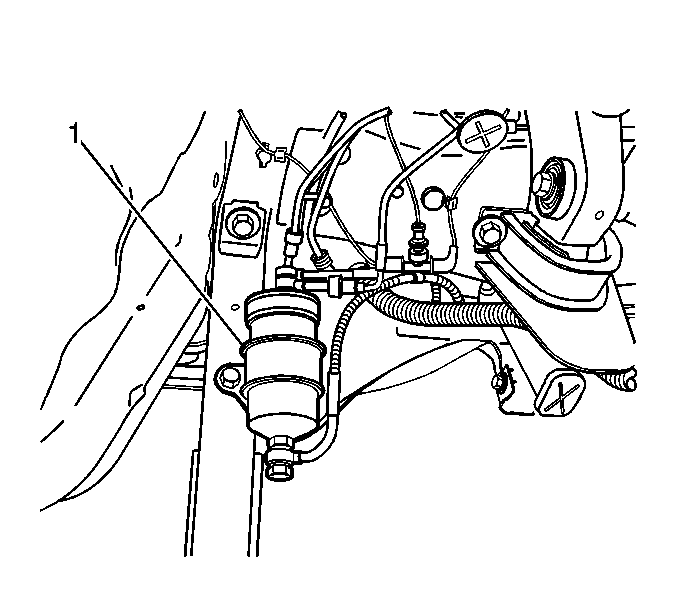Removal Procedure
Caution: Gasoline or gasoline vapors are highly flammable. A fire could occur if an ignition source is present. Never drain or store gasoline or diesel fuel in an open container, due to the possibility of fire or explosion. Have a dry chemical (Class B) fire extinguisher nearby.
- Keep a shop cloth and a container ready to capture any spilled fuel.
- Relieve the fuel system pressure. Refer to Fuel Pressure Relief .
- Clean the fuel filter connections and the surrounding areas before disconnecting the fuel pipes in order to avoid possible contamination of the fuel system.
- Using a primary and backup wrench, remove both of the in-line fuel filter line bolts.
- Loosen the fuel filter strap attaching bolt.
- Remove the fuel filter (1) from the vehicle.

Installation Procedure
- Clean the fittings on both of the fuel lines and on both of the bolts.
- Remove the protective caps from the new filter.
- Install the new filter (1) in the same position as the old filter, noting the direction of the flow that is indicated on the filter.
- Install the in-line fuel filter line bolts.
- Install the fuel filter strap attaching bolt.
- Tighten the fuel filler cap.
- Connect the negative battery cable.
- Crank the engine for a few seconds, if the engine starts, turn OFF the engine. Check for any fuel leaks.

Notice: Use the correct fastener in the correct location. Replacement fasteners must be the correct part number for that application. Fasteners requiring replacement or fasteners requiring the use of thread locking compound or sealant are identified in the service procedure. Do not use paints, lubricants, or corrosion inhibitors on fasteners or fastener joint surfaces unless specified. These coatings affect fastener torque and joint clamping force and may damage the fastener. Use the correct tightening sequence and specifications when installing fasteners in order to avoid damage to parts and systems.
Tighten
Tighten the bolts to 25 N·m (18 lb ft).
Tighten
Tighten the bolt to 18 N·m (13 lb ft).
